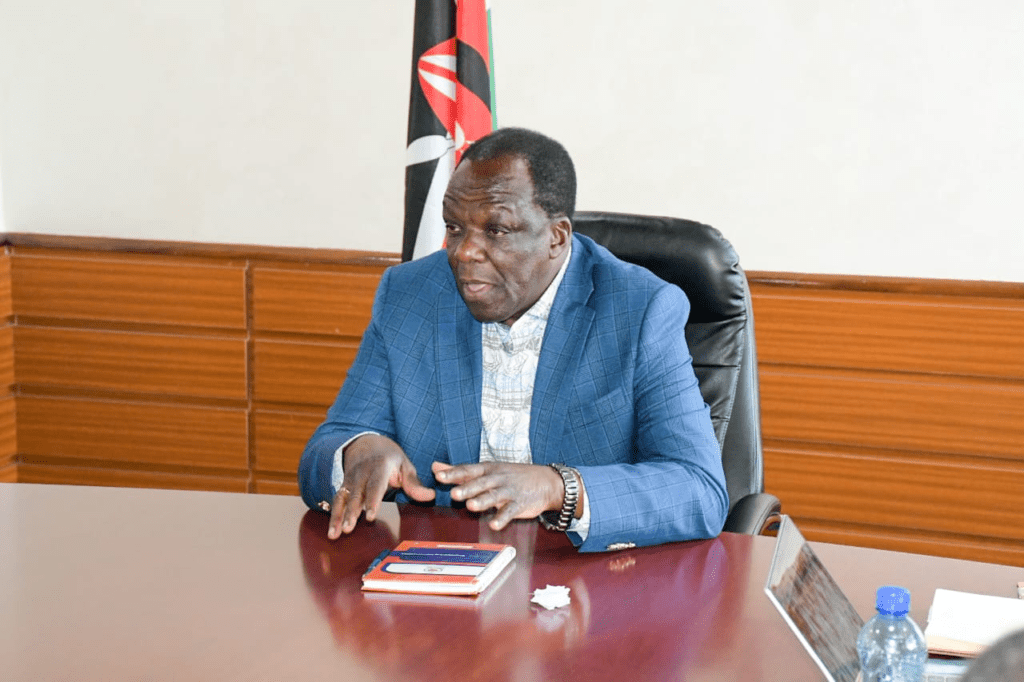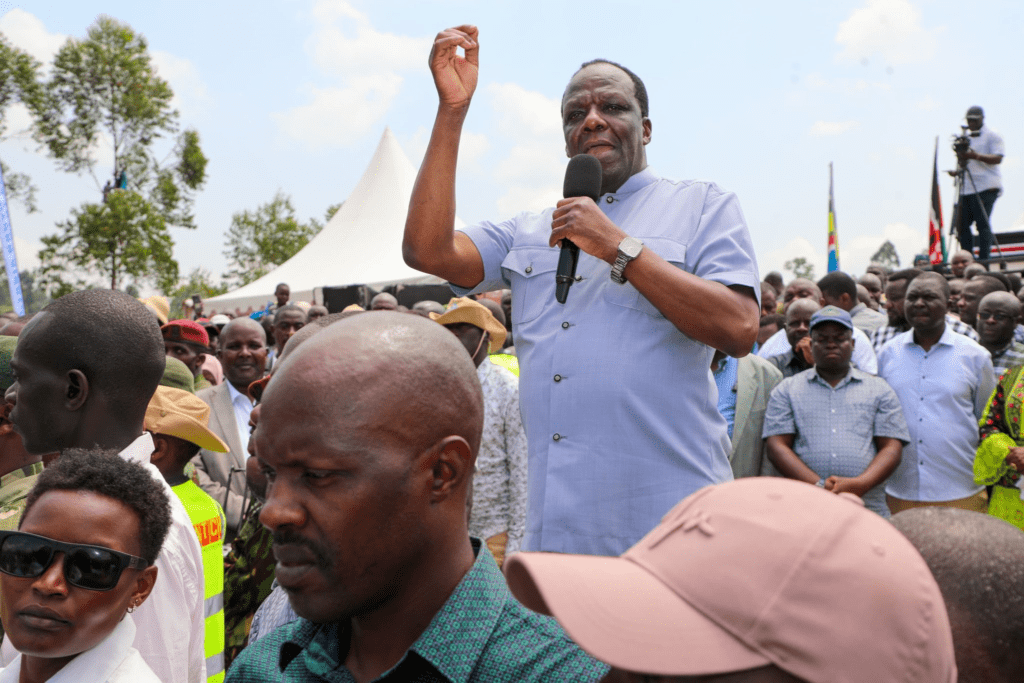Q1. What are your achievements in 100 days since your historic appointment as CS for Cooperatives and MSMEs?
In my first 100 days, the ministry has taken transformative steps to improve the cooperatives and MSMEs sectors. These include streamlining the cooperative registration process by introducing a digital registry to enhance transparency and accessibility. Over one million new beneficiaries accessed the Hustler Fund, boosting financial inclusion. Additionally, we rolled out capacity-building programs for cooperative leaders and introduced youth and women empowerment initiatives, especially in underserved regions.
Q2. What are the policy and legal parameters that have come to enable your work?
Progress has been achieved through robust policy and legal frameworks, including the Cooperative Bill, 2024 currently before Parliament for consideration.
The ongoing governance reforms include audits and restructuring of KUSCCO, issuance of circulars for fair coffee payments at the Nairobi Coffee Exchange (NCE), and appointment of a new NCE board, regulation of the payment of the SACCO dividends.
The standing disputes in the coffee cooperatives in Barichu FCS in Nyeru and Kangunu FCS in Muranga have been adequately resolved.
We have also improved liquidity of SACCOs through recovery of KES 165.1 million on non-remitted funds held by employers.
The Ministry has started capacity-building programs on alternative dispute resolution and trained 80 cooperative personnel including the 47 County Directors for Cooperatives to improve and hasten dispute resolution in the cooperatives business.
These efforts align with the Micro and Small Enterprises Act, 2012, and the Bottom-Up Economic Transformation Agenda (BETA), creating an enabling environment for cooperatives and MSMEs.

Q3. What are the plans you have to improve cooperative memberships in rural areas?
To boost rural cooperative membership, the ministry is conducting sensitization campaigns and offering incentives like low-interest loans for agriculture and agribusiness. Localized cooperative resource centers provide training and support. Additionally, new cooperatives in artisanal fishing, mining, and value chains such as avocado farming are being registered. Expanding coffee production to new regions like Kericho and Western Kenya forms part of a master plan to enhance rural livelihoods.
Q4. How would you rate the Hustler Fund with respect to absorption and repayments in the past 100 days?
The Hustler Fund has shown exceptional absorption, with over 24.7 million beneficiaries, 62% being youths. Over KES 60.4 billion was disbursed, and KES 47.9 billion repaid. While it has transformed access to affordable credit, challenges in financial discipline and digital literacy remain. We are finalizing additional MSME products under the fund to address these gaps and expand its impact.
Q5. Statistics show that many start-ups don’t last the second year of their establishment. What are you doing to sustain innovation and entrepreneurship among the Kenyan youth?
Recognizing the challenges faced by start-ups, the ministry has put in place several measures to sustain innovation and entrepreneurship among youth. We are in the process of partnering with stakeholders to establish innovation hubs where young entrepreneurs can access mentorship, funding, and technical support.
To ensure market access, we are creating platforms such as trade fairs and online marketplaces that connect MSMEs to buyers locally and internationally. Additionally, we are rolling out youth-targeted financial and enterprise development programs like the National Youth Opportunities Towards Advancement (NYOTA), Center For Entrepreneurship (C4E), and Kenya Jobs and Economic Transformation (KJET) projects that are aimed at enhancing youth entrepreneurship and employability.
We are also currently working on a Start-Up Bill that will provide mechanisms for the nurturing and commercialization of innovations in Kenya.
Q6. Financial Literacy has been identified as a major gap in financial management and capacity to invest. What measures and programs are there in place to shore up capacity building in financial literacy among MSMEs?
The ministry has prioritized financial literacy as a critical area for MSME growth. We have lined up workshops and training programs across the country, teaching MSME owners essential skills such as bookkeeping, budgeting, and investment management. To complement these efforts, we intend to partner with fintech companies to develop mobile applications and tools that help MSMEs track their finances and gain actionable insights.
The linkage between cooperatives and MSMEs is key to this agenda. Therefore, we are engaging cooperatives and their leaders to facilitate the delivery of financial literacy programs to their members, the majority of whom are MSMEs, ensuring inclusivity for and accessibility to all MSMEs.
Q7. Many a critic have doubted the efficacy of the Bottom-Up Economic Transformation Agenda (BETA), given the high rates of inflation as well as cost of living. How does your ministry action plan align to have Kenyans see the fruits of this blueprint if the KK administration?
The ministry’s action plan is aligned with the Bottom-Up Economic Transformation Agenda (BETA). By empowering MSMEs with affordable financing through the Hustler Fund and Uwezo Fund, we are enabling grassroots businesses to thrive.
We are also revitalizing the agricultural sector through cooperatives, enhancing productivity and income for farmers while stabilizing food prices.
Moreover, our job creation initiatives focus on sustainable projects in both rural and urban areas through the aggregation of artisans into worker cooperatives to participate in the affordable housing program in the rural areas; aggregating other professions into worker cooperatives to create meaningful and decent work for the youth and women, directly addressing economic challenges faced by Kenyans. These measures ensure that the fruits of the BETA blueprint are felt in tangible ways, especially by the most vulnerable populations.
Q8. When you joined President Ruto’s cabinet to form what is now called the Broad-based Government, there was so much hope for improved lives and prosperity. Do you think this has been achieved? Why?
While there is still much to be done, significant progress has been made. The cooperative and MSME sectors have seen increased participation and financial inclusion, with programs like the Hustler Fund proving transformative. However, challenges such as inflation and unemployment persist, requiring continued action. The government under the leadership of H.E. President Ruto remains committed to addressing these issues through targeted interventions and policy reforms. The foundation for long-term prosperity has been laid, and we are confident that Kenyans will see tangible improvements in their lives in the coming months.
Q9. There is trouble in the coffee, tea, and sugar sectors with respect to pricing and cost of production. What are the interventions to alleviate these macroeconomic dynamics affecting the growth of the sectors?
The ministry continues implementing several interventions to address challenges in the coffee, tea, and sugar sectors. Subsidies have been provided for essential inputs like fertilizers and seeds to reduce production costs. We have also introduced price stabilization mechanisms and strengthened the bargaining power of farmer cooperatives to ensure fair pricing. For example, the Ministry has influenced the allocation of funds to New KPCU Ltd to accept all coffee from farmers who have no capacity to mill and store it for them awaiting marketing; New KCC has been given funds to mop all milk from farmers during glut and convert it into milk powder as a strategic food reserve and hence stabilize prices through all seasons.
Additionally, we are promoting value addition by encouraging local processing of these products to increase profitability and market competitiveness. These interventions aim to restore the vitality of these critical sectors.

Q10. Nyanza, Western, and Coastal regions have very weak cooperative culture and tradition. Do you have any plans to mobilize the populace in these regions to create and join cooperatives to improve agriculture and fish production with the aim to improve pesa mfukoni among the people?
We have tailored specific strategies for Nyanza, Western, and Coastal regions to boost cooperative culture. Awareness campaigns are ongoing to educate residents on how cooperatives can improve their livelihoods by enhancing access to markets and credit. We will aggregate them into specific value-chain cooperatives and empower them to improve their livelihoods.
We are also focusing on sector-specific cooperatives, such as fishery cooperatives (transforming BMUs) into cooperatives along the Coast and agricultural cooperatives (coffee, sugar, maize, cereals, avocado, and other fresh produce) in Nyanza and Western regions.
Additionally, funds and technical assistance have been allocated to help these communities establish and sustain cooperatives, ensuring that income generation and economic empowerment become a reality.
Q11. What are your last comments?
My last comments are on the performance contract that we recently signed under the leadership of H.E. President William Ruto. His directive to us was clear that we deliver on the targets with urgency.
Performance contracting has been a cornerstone of ensuring accountability and efficiency in ministry operations. As we continue implementing our agenda, I remain optimistic about the transformative potential of cooperatives and MSMEs in driving Kenya’s economic growth. I urge Kenyans to embrace these initiatives and actively participate in the programs offered by the ministry.
As a ministry, we are committed to driving impactful results for the people of Kenya. Together, we can achieve a more inclusive and prosperous economy where every Kenyan has the opportunity to succeed.




